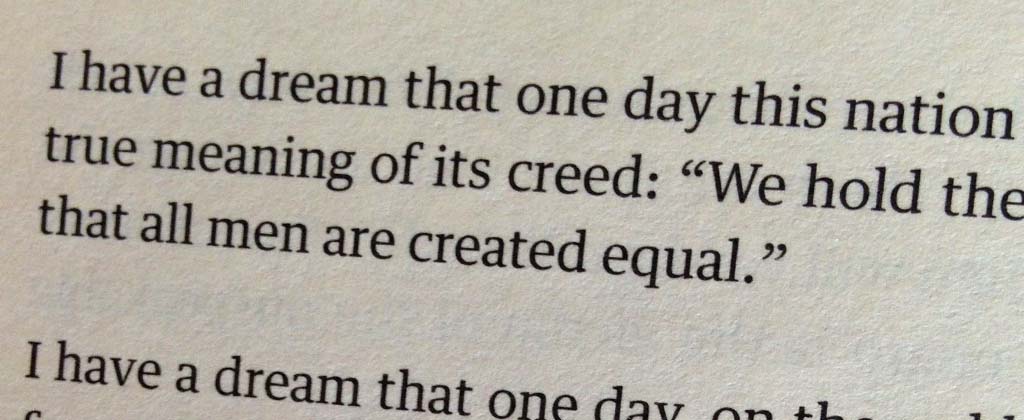Great Speeches: Martin Luther King - August 28th 1963
This post is part of a Series on Great Speeches. In 2007 The Guardian published a series of booklets, with accompanying cd, entitled Great Speeches of the 20th Century, ranging from Winston Churchill to Nelson Mandela, Emmeline Pankhurst to Virginia Woolf.
Martin Luther King’s speech "I have a dream…" must be one of the most well-known of the last century. And as is typical with the familiar, we tend to find comfort even in the most painful of things.
In recent years, the term “Black Lives Matter” as a slogan of protest has been used across the media to capture something that shouldn’t need to be said. ‘Yes of course ‘Black Lives Matter’’, we fair-skinned people say. And in doing so we entirely miss the point of protest.
‘I have a dream’ was never meant to be a comforting cry. It should have been just as unnecessary. However King used it to highlight the difference between the American Dream and the reality for Negro Americans. The speech was delivered at The March on Washington for Jobs and Freedom at a time of violent clashes - “unspeakable horrors of police brutality” - against men and women, young and old, because of the colour of their skin. Segregation was still in place at that time across America, and King, in the thick of the fight, warned his listeners, “it would be fatal for the nation to overlook the urgency of the moment … We have come to this hallowed spot to remind America of the fierce urgency of now”.
He began by putting their struggle in context, reminding the crowd of the ‘Emancipation Proclamation’ signed 100 years before. He placed their current status in the context of economic failure, stating that “America has defaulted on this promissory note”. However - just as Churchill gained the trust of the people, not by denying their difficulties or promising them a victory without cost - King reminds his listeners that despite the situation they find themselves in, there is hope.
“...we refuse to believe that the bank of justice is bankrupt … Now is the time to make justice for all of God’s children … [For] we will not be satisfied until justice rolls down like waters and righteousness like a mighty stream”
Hope would seem a poor substitute for equality. However King’s speech, which sometimes seems embarrassingly religious to our post-modern ears, was full of the language of his people. A people for whom the pulpit was a source of strength. He lifts whole passages from the Bible and uses them effortlessly with his own content, not as though they contain precious and unattainable ideals, but as though they have been worn, and tested, and found vitally useful for the task at hand.
And so, he urges them, “Let us not wallow in the valley of despair … even though we face the difficulties of today and tomorrow. I still have a dream.” And then he uses the rhythm and repetition, which we remember so well: "Now is the time … We can never be satisfied ... I have a dream … Let freedom ring"
I have a dream that one day this nation will rise up and live out the true meaning of its creed … I have a dream that one day the sons of former slaves and the sons of former slaveowners will be able to sit down together at the table of brotherhood. I have a dream that my four little children will one day live in a nation where they will not be judged by the colour of their skin but the content of their character
Even then some reporters missed the point. King isn’t even mentioned in The Guardian’s account of the “the largest demonstration the capital has ever seen”, which reached the 100,000 mark.
As we know King was assassinated on April 4th 1968, having received the Nobel Peace Prize in October 1964 for, “combating racial inequality through nonviolent resistance”. In remembering him, The Guardian then reported, "To anyone who was ever there when King spoke, the experience was unforgettable. A small man, barely five foot seven, he dominated the podium or the pulpit. In a slow but sonorous voice, the biblical cadences rolled out ... And the crowd would surge out into the hot and dusty Southern street, and down to the courth house or the city hall with its petitions, its banners and its faith that change was on the way"

